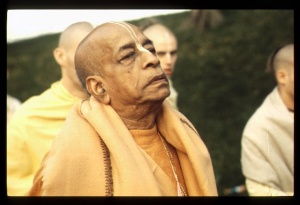CC Madhya 18.213 (1975): Difference between revisions
(Vanibot #0027: CCMirror - Mirror CC's 1996 edition to form a basis for 1975) |
(Vanibot #0020: VersionCompareLinker - added a link to the Version Compare feature) |
||
| Line 2: | Line 2: | ||
<div style="float:left">'''[[Sri Caitanya-caritamrta (1975)|Śrī Caitanya-caritāmṛta (1975)]] - [[CC Madhya (1975)|Madhya-līlā]] - [[CC Madhya 18 (1975)|Chapter 18: Lord Śrī Caitanya Mahāprabhu's Visit to Śrī Vṛndāvana]]'''</div> | <div style="float:left">'''[[Sri Caitanya-caritamrta (1975)|Śrī Caitanya-caritāmṛta (1975)]] - [[CC Madhya (1975)|Madhya-līlā]] - [[CC Madhya 18 (1975)|Chapter 18: Lord Śrī Caitanya Mahāprabhu's Visit to Śrī Vṛndāvana]]'''</div> | ||
<div style="float:right">[[File:Go-previous.png|link=CC Madhya 18.212 (1975)|Madhya-līlā 18.212]] '''[[CC Madhya 18.212 (1975)|Madhya-līlā 18.212]] - [[CC Madhya 18.214 (1975)|Madhya-līlā 18.214]]''' [[File:Go-next.png|link=CC Madhya 18.214 (1975)|Madhya-līlā 18.214]]</div> | <div style="float:right">[[File:Go-previous.png|link=CC Madhya 18.212 (1975)|Madhya-līlā 18.212]] '''[[CC Madhya 18.212 (1975)|Madhya-līlā 18.212]] - [[CC Madhya 18.214 (1975)|Madhya-līlā 18.214]]''' [[File:Go-next.png|link=CC Madhya 18.214 (1975)|Madhya-līlā 18.214]]</div> | ||
{{CompareVersions|CC|Madhya 18.213|CC 1975|CC 1996}} | |||
{{RandomImage}} | {{RandomImage}} | ||
==== TEXT 213 ==== | ==== TEXT 213 ==== | ||
| Line 11: | Line 10: | ||
<div class="verse"> | <div class="verse"> | ||
:aiche līlā kare prabhu śrī-kṛṣṇa-caitanya | :aiche līlā kare prabhu śrī-kṛṣṇa-caitanya | ||
: | :'paścime' āsiyā kaila yavanādi dhanya | ||
</div> | </div> | ||
| Line 32: | Line 31: | ||
<div class="purport"> | <div class="purport"> | ||
The word yavana means | The word yavana means "meat-eater." Anyone from a meat-eating community is called a yavana. One who does not strictly observe the Vedic regulative principles is called a mleccha. These words do not refer to any particular man. Even if a person is born in a brāhmaṇa, kṣatriya, vaiśya or śūdra family, he is a mleccha or yavana if he does not strictly follow the regulative principles or if he eats meat. | ||
</div> | </div> | ||
Latest revision as of 11:20, 27 January 2020

A.C. Bhaktivedanta Swami Prabhupada
TEXT 213
- aiche līlā kare prabhu śrī-kṛṣṇa-caitanya
- 'paścime' āsiyā kaila yavanādi dhanya
SYNONYMS
aiche—in that way; līlā—pastimes; kare—performed; prabhu—the Lord; śrī-kṛṣṇa-caitanya—Śrī Caitanya Mahāprabhu; paścime—to the western part of India; āsiyā—coming; kaila—made; yavana-ādi—meat-eaters and others; dhanya—fortunate.
TRANSLATION
In this way Lord Śrī Caitanya Mahāprabhu performed His pastimes. Coming to the western part of India, He bestowed good fortune upon the yavanas and mlecchas.
PURPORT
The word yavana means "meat-eater." Anyone from a meat-eating community is called a yavana. One who does not strictly observe the Vedic regulative principles is called a mleccha. These words do not refer to any particular man. Even if a person is born in a brāhmaṇa, kṣatriya, vaiśya or śūdra family, he is a mleccha or yavana if he does not strictly follow the regulative principles or if he eats meat.